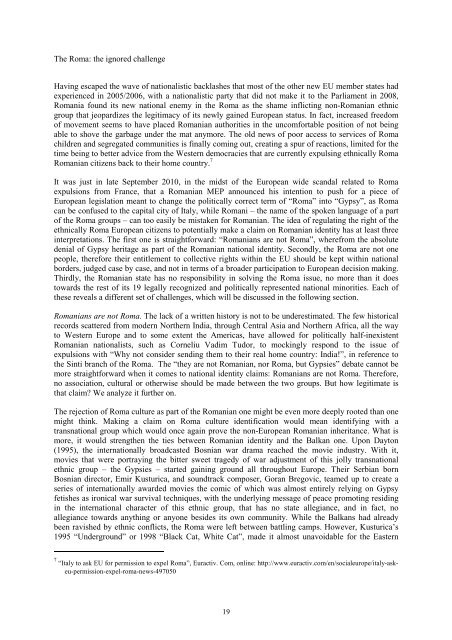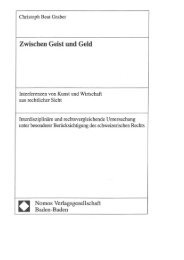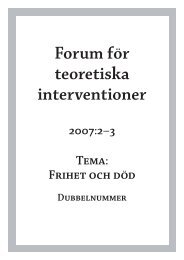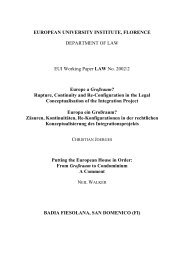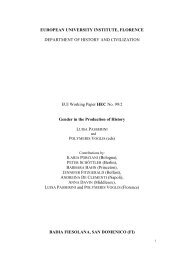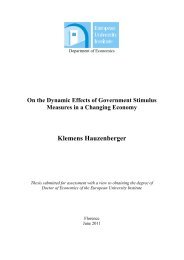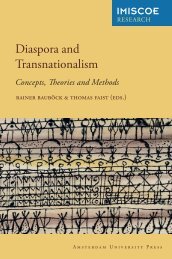Sinziana-Elena Poiana Ioana Lupea Irina-Madalina Doroftei Alina ...
Sinziana-Elena Poiana Ioana Lupea Irina-Madalina Doroftei Alina ...
Sinziana-Elena Poiana Ioana Lupea Irina-Madalina Doroftei Alina ...
Create successful ePaper yourself
Turn your PDF publications into a flip-book with our unique Google optimized e-Paper software.
The Roma: the ignored challenge<br />
Having escaped the wave of nationalistic backlashes that most of the other new EU member states had<br />
experienced in 2005/2006, with a nationalistic party that did not make it to the Parliament in 2008,<br />
Romania found its new national enemy in the Roma as the shame inflicting non-Romanian ethnic<br />
group that jeopardizes the legitimacy of its newly gained European status. In fact, increased freedom<br />
of movement seems to have placed Romanian authorities in the uncomfortable position of not being<br />
able to shove the garbage under the mat anymore. The old news of poor access to services of Roma<br />
children and segregated communities is finally coming out, creating a spur of reactions, limited for the<br />
time being to better advice from the Western democracies that are currently expulsing ethnically Roma<br />
Romanian citizens back to their home country. 7<br />
It was just in late September 2010, in the midst of the European wide scandal related to Roma<br />
expulsions from France, that a Romanian MEP announced his intention to push for a piece of<br />
European legislation meant to change the politically correct term of “Roma” into “Gypsy”, as Roma<br />
can be confused to the capital city of Italy, while Romani – the name of the spoken language of a part<br />
of the Roma groups – can too easily be mistaken for Romanian. The idea of regulating the right of the<br />
ethnically Roma European citizens to potentially make a claim on Romanian identity has at least three<br />
interpretations. The first one is straightforward: “Romanians are not Roma”, wherefrom the absolute<br />
denial of Gypsy heritage as part of the Romanian national identity. Secondly, the Roma are not one<br />
people, therefore their entitlement to collective rights within the EU should be kept within national<br />
borders, judged case by case, and not in terms of a broader participation to European decision making.<br />
Thirdly, the Romanian state has no responsibility in solving the Roma issue, no more than it does<br />
towards the rest of its 19 legally recognized and politically represented national minorities. Each of<br />
these reveals a different set of challenges, which will be discussed in the following section.<br />
Romanians are not Roma. The lack of a written history is not to be underestimated. The few historical<br />
records scattered from modern Northern India, through Central Asia and Northern Africa, all the way<br />
to Western Europe and to some extent the Americas, have allowed for politically half-inexistent<br />
Romanian nationalists, such as Corneliu Vadim Tudor, to mockingly respond to the issue of<br />
expulsions with “Why not consider sending them to their real home country: India!”, in reference to<br />
the Sinti branch of the Roma. The “they are not Romanian, nor Roma, but Gypsies” debate cannot be<br />
more straightforward when it comes to national identity claims: Romanians are not Roma. Therefore,<br />
no association, cultural or otherwise should be made between the two groups. But how legitimate is<br />
that claim? We analyze it further on.<br />
The rejection of Roma culture as part of the Romanian one might be even more deeply rooted than one<br />
might think. Making a claim on Roma culture identification would mean identifying with a<br />
transnational group which would once again prove the non-European Romanian inheritance. What is<br />
more, it would strengthen the ties between Romanian identity and the Balkan one. Upon Dayton<br />
(1995), the internationally broadcasted Bosnian war drama reached the movie industry. With it,<br />
movies that were portraying the bitter sweet tragedy of war adjustment of this jolly transnational<br />
ethnic group – the Gypsies – started gaining ground all throughout Europe. Their Serbian born<br />
Bosnian director, Emir Kusturica, and soundtrack composer, Goran Bregovic, teamed up to create a<br />
series of internationally awarded movies the comic of which was almost entirely relying on Gypsy<br />
fetishes as ironical war survival techniques, with the underlying message of peace promoting residing<br />
in the international character of this ethnic group, that has no state allegiance, and in fact, no<br />
allegiance towards anything or anyone besides its own community. While the Balkans had already<br />
been ravished by ethnic conflicts, the Roma were left between battling camps. However, Kusturica’s<br />
1995 “Underground” or 1998 “Black Cat, White Cat”, made it almost unavoidable for the Eastern<br />
7 “Italy to ask EU for permission to expel Roma”, Euractiv. Com, online: http://www.euractiv.com/en/socialeurope/italy-ask-<br />
eu-permission-expel-roma-news-497050<br />
19


